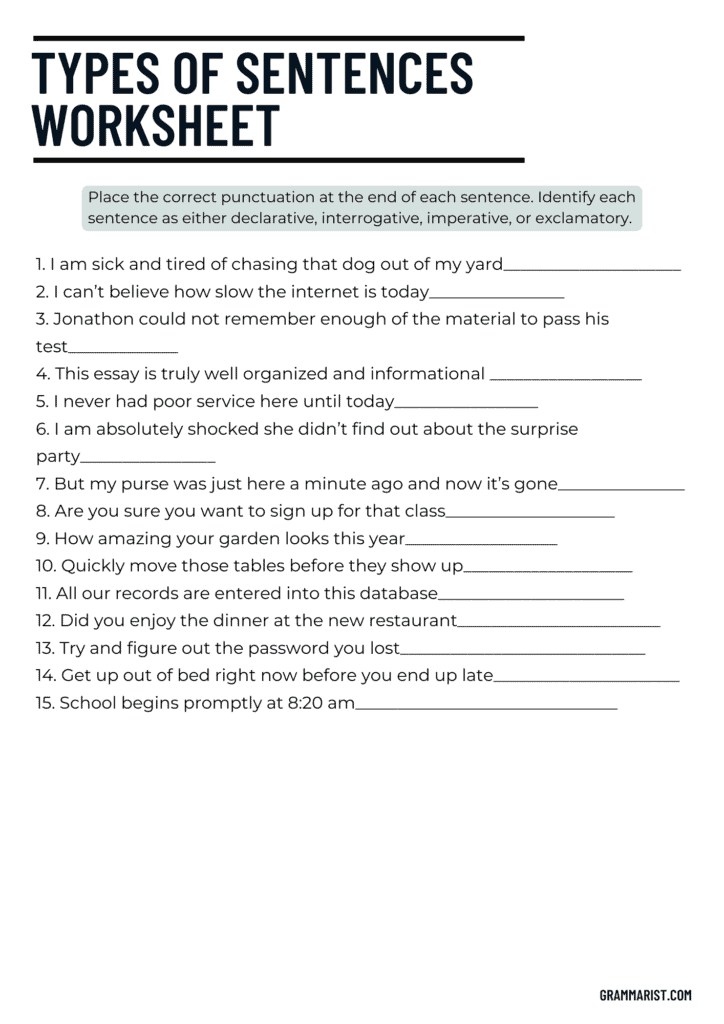
Danielle McLeod is a highly qualified secondary English Language Arts Instructor who brings a diverse educational background to her classroom. With degrees in science, English, and literacy, she has worked to create cross-curricular materials to bridge learning gaps and help students focus on effective writing and speech techniques. Currently working as a dual credit technical writing instructor at a Career and Technical Education Center, her curriculum development surrounds student focus on effective communication for future career choices.
Sentence structure is important, but sentence purpose is necessary for the reader to understand the function of a sentence. Understanding the different types of sentences you can use to make your writing clear and concise is essential and helps your reader understand what point you are making without confusion.
Take a look at the types of sentences you can take advantage of and how to structure them to make your writing the best it can be. Each is provided with examples, and there is even a worksheet you can practice with!
Types of Sentences
There are four types of sentences in the English language: declarative sentences, interrogative sentences, imperative sentences, and exclamatory sentences. These sentences’ word choice and structure help explain the purpose and meaning you are making.
A declarative sentence makes a statement, explains, conveys a fact, or provides information. It can also be called a declarative statement and has a structure that always places the noun before the verb and uses a period [.] for punctuation.
It is the most common type of sentence and is used predominantly by writers to convey information.
An imperative sentence is a command, demand, direct instruction, or request. In most cases, the subject, you, is implied or understood. The structure begins with the main verb, is punctuated with a period [.], and is considered a complete sentence in composition.
An interrogative sentence is a question, a request, or a plea for more information. The structure usually begins with an auxiliary verb or adverb followed by the subject and is punctuated with a question mark [?]. The sentence will often begin with words such as who, what, where, when, how, why, did, would, and could.
A variation of the interrogative sentence is a grammatical structure that converts a declarative or imperative sentence into a question. This is done by adding an interrogative fragment called a tail question, question tag, or tag question.
An exclamatory sentence expresses emotion such as surprise, fear, anger, or excitement and provides added emphasis to the subject. These sentences always end in an exclamation mark [!] and can turn all the other types of sentences into an exclamatory sentence with its addition.
A variation of an exclamatory sentence is known as exclamatory in form. This type of sentence begins with the word what or how but is not a question. It is an exclamation that ends with an exclamation point.
The sentence structure you choose helps make your declarative, interrogative, imperative, and exclamatory sentences understood. Sentences are defined by the use of one or more clauses, and are classified by the number used, as well as the types of clauses contained within the sentence. If you are ever confused by these, you can use a dependable grammar checker to help you reword your sentences for clarification.
The four types of clauses are independent, dependent, relative, and noun. Each contains at least one subject and one verb.
An independent clause can stand alone as a sentence and expresses a complete thought. A dependent clause, also called a subordinate clause, cannot stand alone as a complete sentence and does not express a complete thought.
A relative clause is a type of dependent clause that cannot stand alone as a sentence. It is sometimes referred to as an adjective clause because it gives more information about a noun.
A noun clause is also a dependent clause that cannot stand alone as a sentence. It takes the place of any noun in a sentence.
There are four types of sentence classifications: simple, compound, complex, and compound-complex.
Simple sentences contain a single independent clause. The subject and predicate form a complete thought, and it can have more than one verb. Simple sentences can also include modifications to the subject.
Compound sentences contain two or more independent clauses joined by a semicolon, coordinating conjunction, or conjunctive adverb.
Complex sentences contain one or more dependent clauses attached to an independent clause using either a subordinating conjunction or a relative pronoun.
Compound-complex sentences contain one or more dependent clauses attached to one or more independent clauses.
When you want to make the purpose of your writing clear, use various types of sentences to help emphasize and make your point. Declarative, Interrogative, Imperative, and Exclamatory sentence types provide clarity and bring your meaning to life. Combined with proper sentence structure, you can ensure your writing is understood by a wide range of readers.


Grammarist is a participant in the Amazon Services LLC Associates Program, an affiliate advertising program designed to provide a means for sites to earn advertising fees by advertising and linking to Amazon.com. When you buy via the links on our site, we may earn an affiliate commission at no cost to you.